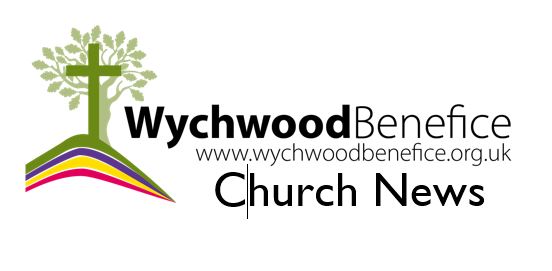
Here is the latest Church News for 240618 + 010718 Trinity 4 & Birth of John The Baptist and Trinity 5 – V1
Wychwood
Benefice
A benefice of three rural parishes in the Cotswolds

Here is the latest Church News for 240618 + 010718 Trinity 4 & Birth of John The Baptist and Trinity 5 – V1

New Vicar Announcement!
We are very pleased to announce that we have appointed a new vicar.
Rev’d Geoffrey Clement, who is currently Rector of the Two Rivers Benefice in the Diocese of St Edmundsbury and Ipswich, will be joining us in October.
His licensing will be on Wednesday 17th October, 7.30pm. More details to follow.
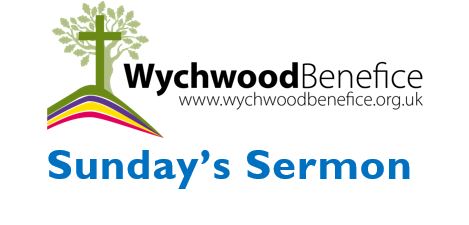
Second Sunday after Trinity
Readings: Genesis 3, 8-15; 2 Cor. 4. 13-5.1; Mark 3 20-end
Last week I baptised Alexander in Milton church, in two months I’ll marry Chloe and Craig in Shipton, today we shall share directly or indirectly in another token or sacrament of trust and intense meeting-points between God and all people of God: Christ’s Body and Blood in the bread and wine of the Eucharist. Whatever our church background, we probably all see a sacrament as an intentionally set aside time of being open to grace flowing from and linking us more intensely to God than usual.
Sacraments aren’t some sort of ‘now you see it now you don’t’ magic nor trivial items on an event management programme. Each sacrament is more food for the journey of faith, the journey of life. As a long-retired Roman Catholic priest said some years ago, ‘a marriage isn’t a sacrament on the day of the wedding: we can only hope the couple will one day realise, in five, ten or fifteen years, that they are living a sacrament.’ Like breakfast, which nourishes long after the cups are washed and the crumbs wiped from the mouth, a sacrament is not completed when the chalice is cleaned, the confetti wept up or the font emptied: a sacrament offers a light for our forward journey, shining not just on the transient things that are seen but, as Paul put it, to the eternal things that are unseen.
The Eucharist, the Great Thanksgiving, feeds us repeatedly on the journey. The tokens of trust from God encapsulated in the wafer and wine, the Body and Blood of God, are eaten together to illustrate our sharing of the one bread in the community of Christ: if no one turns up for communion, the priest cannot consecrate. Sacraments represent the flowing of God into our lives, and through that inflowing, the passing on of that embracing love of God to others. It would be meaningless for us dispassionately to observe a sacrament such as baptism or marriage as if it were a theatre performance rather than a challenge to and support of our faith life. Equally, if we received the gifts of God around this table yet greedily held on to them, preventing the onward flow of God’s loving care, we would make a nonsense of our faith. Sacraments are food to be shared by all people for all people.
And all people have the potential to think, remember, oppose, choose, in that journey to human responsibility illustrated in our Genesis reading. The snake manipulated Eve with the bait of wisdom. And yet that was a benefit, as without it humans lack the capacity for reasoned choice: at best we’d be smart monkeys. Shirking responsibility, Adam’s response to God’s clear question ‘did you eat the apple?’ was not ‘yes’ but ‘she made me do it,’ and likewise Eve’s response to that same question was not ‘yes’ but the equally irresponsible, ‘the snake made me.’
Before that point, we are offered the image of a cosy predictable life in Eden: afterwards, they became both vulnerable and aware, focussing on their own family. It is easy to idolise Eden- we might idolise the glorious past, or some distant shore, both of which were and are as ordinary and muddled as today here – or puff it up into a cataclysmic disaster rather as description of the birth of the mind. One outcome of such thinking demonises Eve, and women, as the source of all human disaster in another ‘passing the buck in Eden’ scenario, and it is a misogynist scene churches in their associated communities have kept alive throughout the centuries. If we look at the text carefully, we can deal with that. But there’s another problem, perhaps a bigger problem, and yet another example of buck-passing. It’s irresponsible egoistic fatalism: ‘that’s just how we are since “the apple” so we can’t change the world’. This allows us to ignore present realities of oppression and abuse which we have a human and a Christian responsibility to oppose.
Jesus’ abrupt words in the Gospel ‘my family are not my mother, my brothers, nor other religious leaders but anyone who does the will of God’ upset many who hear them. He was not rejecting his family of origin, the family to which his birth ascribed him, but rather making clear that there is a new and wider family of adoption. Moreover, he is making clear (as does Genesis) that firstly responsibility goes along with wisdom and choice, and secondly, that that responsibility is to all, not just our family of origin or creation. I say ‘not just’ advisedly, because Jesus carefully ensured his own mother would be cared for after his death. We each have immediate and permanent obligations to care for our family members but we also have obligations to that larger family, the family of God as expressed in the world-wide church.
‘Community’ for Jesus is people walking, talking, doing the will of God, supported by their common life in Christ nourished by the sacraments. That is the journey which, young or old, weary or spritely, is fed by the food of faith: let us prepare to eat and be glad.
Revd Dr Elizabeth Koepping
Milton under Wychwood

Here is the latest church news 100618 + 170618 Trinity 2 and Trinity 3 Fathers Day1
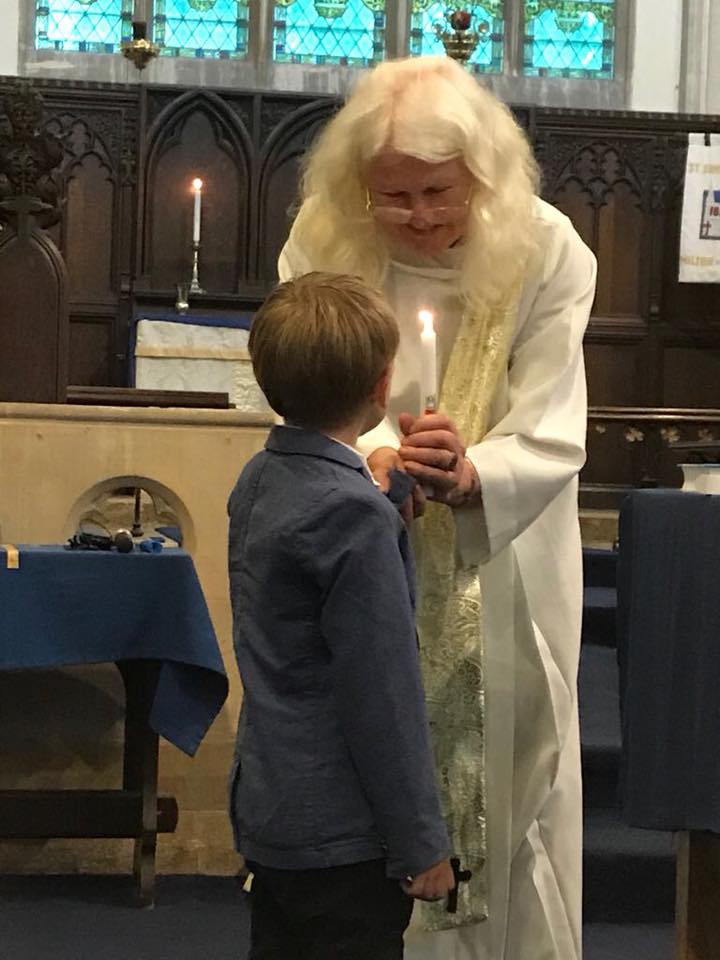

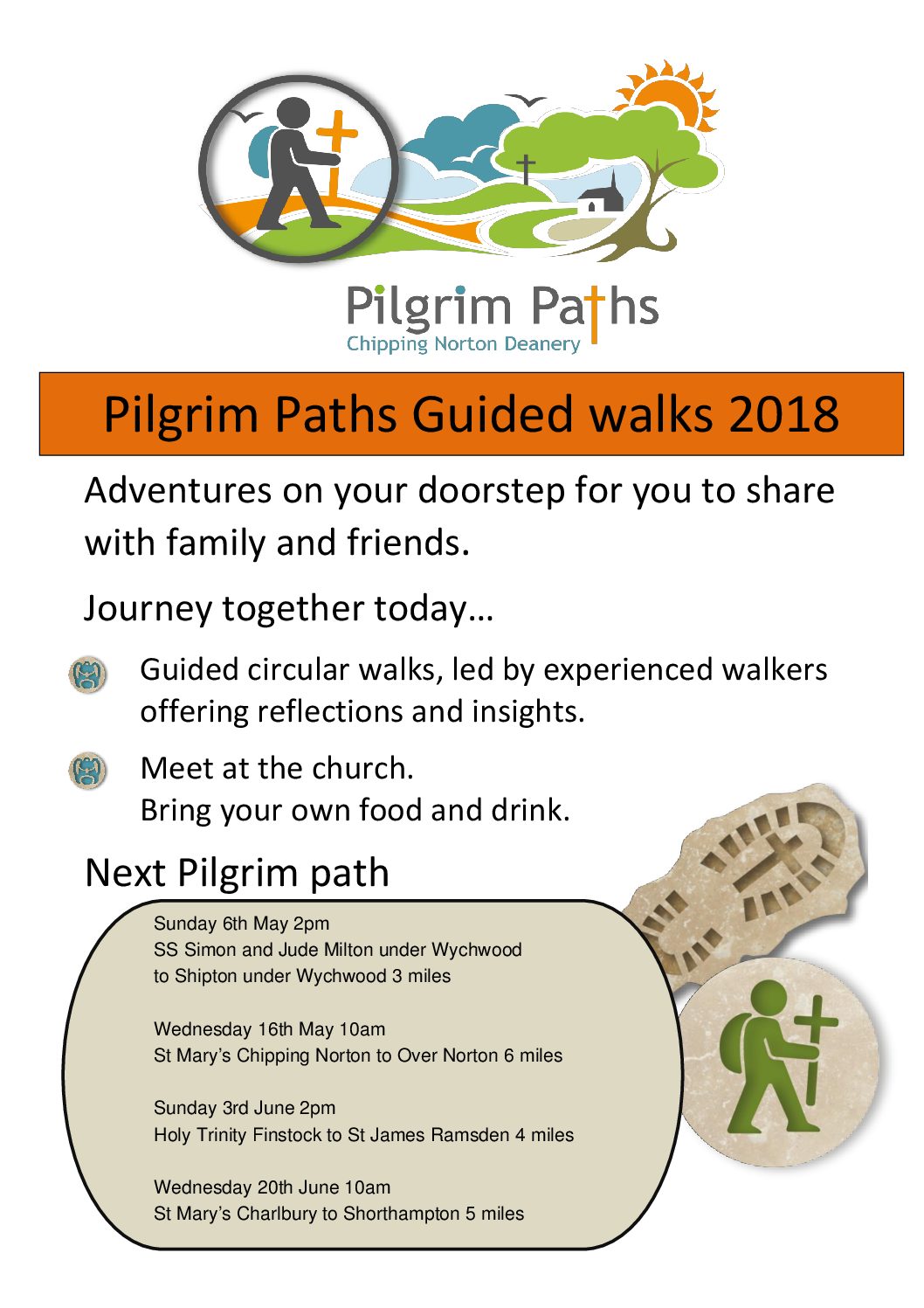
Adventures on your doorstep for you to share with family and friends.
Journey together today…
Guided circular walks, led by experienced walkers offering reflections and insights.
The first Pilgrim Path guided walk will be on:
Sunday 6th May at 2pm. The walk will be from
Milton church to Shipton (3 miles).
Meet at Milton church and do bring your own refreshments.
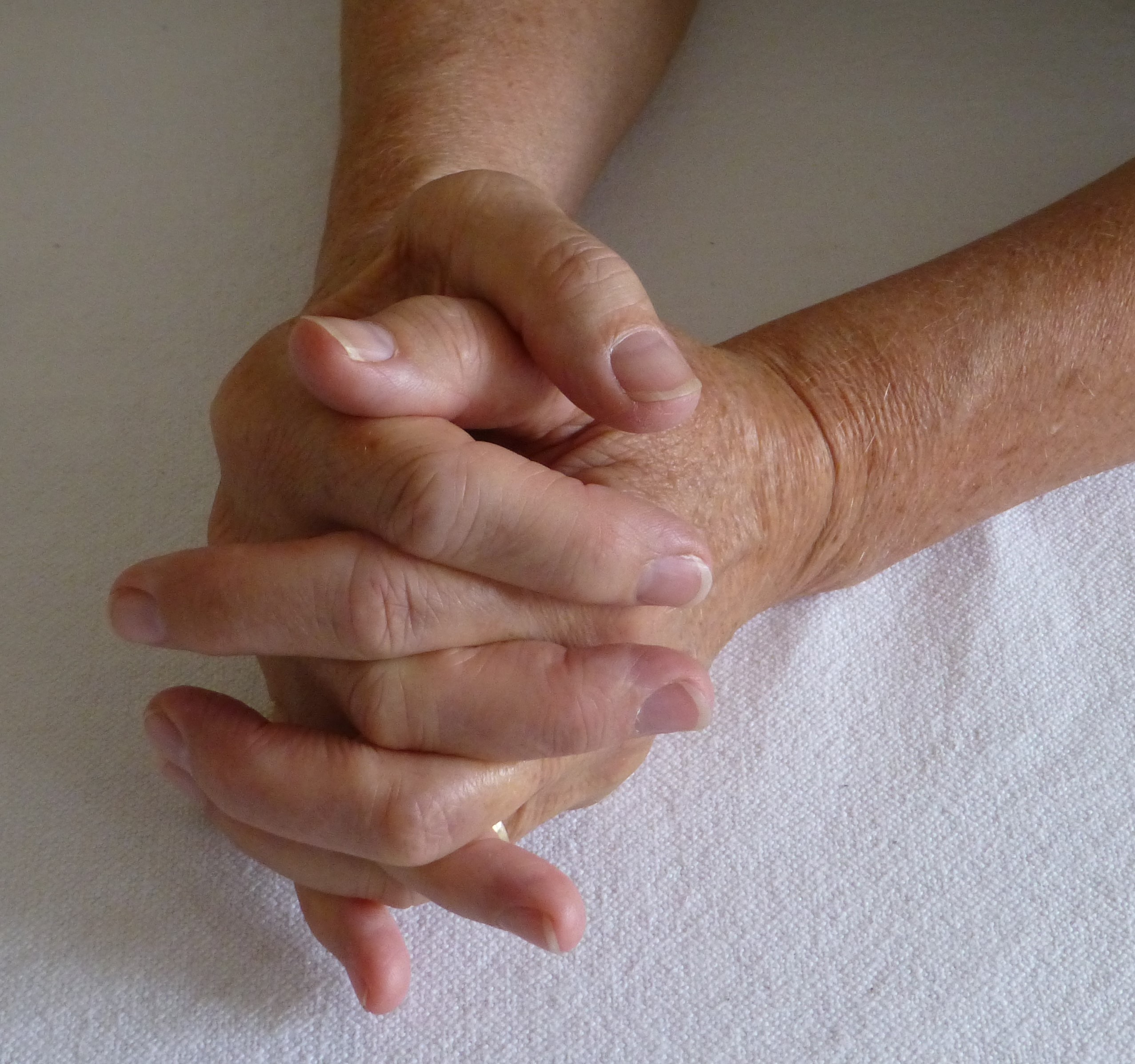
Midday Prayers
Midday Prayers are open to all and take place on Mondays in the Benefice Centre behind St Simon and St Jude Church, Milton under Wychwood.
“Midday prayers is a time for quiet reflection on varied matters, for which our prayers are needed. The readings often turn out to be most appropriate. Not only parochial “for the sick”, but also wider issues are raised and there are frequent occasions ‘when two or three are gathered together, you grant their requests ‘.
As a relative newcomer to midday prayers I can say what a difference it makes to be able to gather with some of the “church family” to discuss and pray over, issues and problems that cannot necessarily be addressed on a Sunday. It keeps a sense of continuity of being “church” in this community from week to week and allows us to get to know other members of our “fellowship” and promotes just that – fellowship.. It also provides a forum for us to be able to support each other in our needs and to help us maintain a closer Christian walk which at times is particularly challenging!
I come to midday prayers to share with others our own concerns, and those for people in our church and community and in the world, and remembering to thank God for his goodness – blessings we have received and answers to prayers. It is a more intimate space than church because there are only a few of us. As a result we have got to know each other well and feel free to share things that we might feel uncomfortable about mentioning on a Sunday morning. It is also good to read the set daily bible passages together, which often tie in miraculously with what we have been talking or thinking about. It would be great if more people could come and enjoy them –Monday prayers are a welcome time of thoughtful reflection during a busy day and an opportunity to share concerns and give thanks with dear friends. It has become a valued part of my life.”

Here is Sunday’s sermon by Revd. Dr. Elizabeth Koepping

Here is the latest Church News 270518 + 030618 Trinity Sunday and Trinity 1

To read the latest news click here 130518 + 200518 Easter 7 and Pentecost